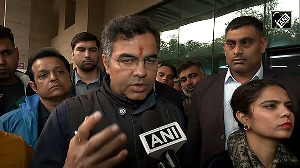Regularly monitor your account for any suspicious activity.
Keep your devices updated with the latest security patches to prevent vulnerabilities.
Ensure the physical wallet you use is stored securely to avoid loss or theft.

With Bitcoin recently crossing the Rs 100,000 mark (it has fallen to around $97,023 since), many retail investors are getting drawn to cryptocurrencies.
These novices must pay heed to safety by first choosing a safe exchange and then ensuring their cryptocurrency holdings are stored safely.
Choose a secure exchange
Select an exchange registered with the Financial Intelligence Unit-India (FIU-IND), as these comply with the country's regulatory framework.
"These platforms adhere to mandatory Know Your Customer (KYC) protocols. This acts as a strong deterrent against fraud by verifying user identities," says Prashant Verma, chief growth and marketing officer, CoinDCX.
Operational history matters. "Safe cryptocurrency exchanges are those that have been around for a long time, have many users, and have no history of security breaches or other security incidents," says Udbhav Tiwari, director, global product policy, Mozilla.
Vishal Saraswat, head, research and innovation, cybersecurity practice, Bosch Global Software Technologies, suggests examining the safety-related certifications and licences the exchange holds.
Go with an exchange that offers security features such as two-factor authentication (2FA), withdrawal whitelist, and encryption.
"The exchange should also publish quarterly Proof of Reserves (PoR) and Liabilities reports, verified by third-party crypto auditors, to ensure it holds assets equal to customer holdings," says Verma.
An exchange should also purchase insurance for the crypto assets stored with it.
Saraswat suggests researching the exchange's reputation through reviews (on sites like Reddit) and news articles (to find out if it has fallen prey to a breach in the past).
Background checks on promoters and board members must be carried out.
"Often, start-up exchanges claim to have reputed persons on their boards, but a closer examination reveals they do not. That should act as a red flag," says Saraswat.
The exchange must also have a robust grievance redress mechanism to address concerns promptly.
Tiwari advises against selecting exchanges solely for lower fees, especially if they are new and lack strong security features.
Exchanges operating in other jurisdictions may also be avoided as they may not comply with Indian laws.
Safe storage options
Cryptocurrencies can be stored in hot or cold wallets. A hot wallet is connected to the Internet. Mobile, desktop, or Web wallets are examples of hot wallets.
"They are suited for storing cryptocurrencies that may be required for frequent trading or transactions. However, they are vulnerable to online threats like hacking or phishing," says Prashant Mali, an advocate and expert on cybercrime.
In contrast, a cold wallet remains offline.
"A cold wallet is highly secure and is suitable for long-term storage. However, it is less convenient for frequent transactions," says Mali.
He suggests using a cold wallet for large holdings and keeping smaller amounts in a hot wallet (or with the exchanges) for trading.
The cold wallet, according to him, should be a hardware wallet (from a reputable brand like Ledger or Trezor), which should be kept in self-custody.
Strengthen passwords
Use a password manager to generate and store randomised passwords. Ensure the passwords have at least 16 characters, and include alphanumeric and special characters.
Mali suggests enabling two-factor authentication (2FA) using apps like Google Authenticator (instead of SMS-based 2FA).
Additional security tips for navigating crypto world
- Use the withdrawal whitelist (which allows users to specify a list of wallet addresses to which withdrawals can be done) feature to restrict transfer of cryptocurrencies to known and trusted destinations
- Safeguard your private keys and seed phrases, as losing them means permanent loss of access to funds
- Regularly monitor your account for any suspicious activity
- Keep your devices updated with the latest security patches to prevent vulnerabilities
- Ensure the physical wallet you use is stored securely to avoid loss or theft
- Use a virtual private network (VPN) for secure internet access; avoid public Wi-Fi at locations like airports or hotels
- Stay informed about the latest scams to protect your assets
Disclaimer: This article is meant for information purposes only. This article and information do not constitute a distribution, an endorsement, an investment advice, an offer to buy or sell or the solicitation of an offer to buy or sell any securities/schemes or any other financial products/investment products mentioned in this article to influence the opinion or behaviour of the investors/recipients.
Any use of the information/any investment and investment related decisions of the investors/recipients are at their sole discretion and risk. Any advice herein is made on a general basis and does not take into account the specific investment objectives of the specific person or group of persons. Opinions expressed herein are subject to change without notice.
Feature Presentation: Ashish Narsale/Rediff.com












 © 2025
© 2025